The International Institute for Middle-East and Balkan Studies (IFIMES) in Ljubljana, Slovenia, regularly analyses events in the Middle East and the Balkans. IFIMES has prepared an analysis of current political situation in Kosovo and published a public opinion poll following the loss of parliamentary majority and in view of the talks between Vučić and Thaçi on Serbian-Albanian border changes and an exchange of territories. The most relevant and interesting sections from the comprehensive analysis entitled “Kosovo 2018: A new election?” are published below.
The incumbent Kosovo government was formed in September 2017. It is composed of the PAN coalition gathered around Kadri Veseli's Democratic Party of Kosovo (PDK), the Initiative for Kosovo (Nisma) led by Fatmir Limaj and the Alliance for the Future of Kosovo (AKR) led by Behgjet Pacolli with the support of the Serbian list and the deputies of other minority communities in Kosovo.
At the beginning of September 2018 the IFIMES International Institute for Middle-East and Balkan Studies published an analysis entitled “Kosovo-Serbia relations in 2018: The Vučić-Thaçi agreement for two million new refugees?” (available at: http://www.ifimes.org/ba/9566,3/9/2018).
Kosovo government led by Prime Minister Ramush Haradinaj was formed with the support of MPs from the Serbian List who obeyed the orders of Serbia's President Aleksandar Vučić (SNS) and voted for Haradinaj's government. Kosovo government soon lost parliamentary majority, and without Serbian MP's it was not even able to adopt the decision in September 2018 on the selection of Kosovo delegation for conducting the dialogue with Belgrade. A scenario that could have happened at the beginning of September 2018 was that Vučić would order Serbian MPs in Kosovo parliament to vote for the delegation that would lead the dialogue directly with him in Brussels. Nevertheless, that did not happen. Analysts have pointed to the danger of a direct liaison between Aleksandar Vučić and Hashim Thaçi, (PDK) who – with the cooperation of Albanian Prime Minister Edi Rama (PS) – represent the backbone of political crime in this part of the region.
The government led by Hashim Thaçi and his clan is characterised by nepotism, intimidation of political opponents and citizens, pressures on the media, racketing, crime, non-transparency and corruption in every sphere of Kosovo society. An especially worrying trend is massive emigration of the young generation and the working age population The government of Kosovo has not managed to stop this negative trend. Organised crime and corruption represent a serious threat to Kosovo society and to the state. The incumbent government has further aggravated the crisis and increased citizens' dissatisfaction.
According to the 2017 corruption index from Transparency International, Kosovo is ranked 85th of all together 180 countries which were included in the survey on corruption, thus occupying the same position as Argentina, Benin, Kuwait, Solomon Islands and Swaziland (Source: Transparency International Corruption Perceptions Index 2017).
According to the Reporters Without Borders assessment of media freedom Kosovo ranks 78th of 180 countries and belongs to countries with partly free media. In the region it is preceded by Bosnia and Herzegovina which ranks 62nd, as well as by Croatia and Albania ranked 69th and 75th respectively, while Montenegro and Macedonia are ranked 103rd and 109th respectively (source:Reporters Without Borders).
Analysts have estimated that dissatisfaction with the Kosovo government is present not only among the majority Albanian population but also among the members of minority ethnic communities, bearing in mind that the government has not done enough to fight organised crime and corruption, improve the standard of living and the security situation, increase employment rates, attract foreign investments, improve the respect of fundamental human rights, and free the media which are still controlled by the government, political parties and tycoons. The government has not changed its political approach in order to develop effective employment programmes, modify the economic investment policy and make further investments in the implementation of the justice system and the rule of law, which currently accounts for only 1 % of GDP.
Aleksandar Vučić and Hashim Thaçi have taken the initiative to correct (i.e. redefine) the borders between Serbs and Albanians, which would actually lead to changes in the existing borderline and an exchange of territories and inhabitants between the two states. Thus, northern Kosovo would belong to Serbia (thus it would no longer be necessary to form the Community of Serb Municipalities there), while most of the Preševo valley (Preševo, Medvedja and Bujanovac – which are regarded as “east Kosovo”) would belong to Kosovo (to which it had actually belonged till 1956).
According to Vučić and Thaçi this would permanently solve the problem between Serbs and Albanians. However, analysts warn that this would not solve the problem but instead cause new conflicts, victims, tragedies and at least two million new refugees. Another figure involved in this initiative is Albanian Prime Minister Edi Rama. He is surrounded by advisers from Kosovo who had strong connections with Milošević regime in 1990s. Kosovo opposition, notably the Self-Determination movement (LV) and the Democratic League of Kosovo (LDK), strongly rejects the borderline initiative, demanding President Thaçi to abandon the idea that may have devastating repercussions for Kosovo. LV organised mass protests on 29 September 2018 to express dissatisfaction with the devastating politics led by the incumbent government and President Hashim Thaçi.
Although all previous wars in the territory of SFRY were fought in order to change the borders, those borders were actually never changed. The wars only brought new problems. The EU is based on diversity, and many EU states are multi-ethnic, multicultural and multi-confessional, which makes the Vučić-Thaçi initiative anti-civilizational and anti-European. The Vučić-Thaçi borderline initiative undermines the foundations of the EU and USA concepts of multi-ethnic communities. However, the initiative veils Vučić's attempts to save at least some of the failed Greater Serbia project designed by Slobodan Milošević. Aleksandar Vučić and Ivica Dačić (SPS) actually symbolise Milošević's politics from 1990s, and according to that project the loss of a part of the territory in Kosovo would be compensated by annexation of a part of the territory of Bosnia and Herzegovina, i.e. the Republika Srpska entity. The Greater Serbia project even includes parts of Montenegro and Croatia. Pro-Serbian political parties in Montenegro which are members of the Democratic Front (DF) opposition have together with the Serbian national council already started to create the destructive atmosphere by launching the activities for gathering the signatures for the petition to annul Montenegro's decision to recognize Kosovo's independence.
The realisation of the Vučić-Thaçi agreement would cause tectonic changes in the region, leading to new conflicts, victims, tragedies and a new wave of at least two million refugees who would have to seek shelter in EU states. Therefore, those who support such an agreement will have to take responsibility for its devastating consequences.Kosovo special police units (ROSU) were deployed at the artificial lake and hydro-power plant Gazivode and they entered the Ecology and Sports Development Centre at Zubin Potok only a few days before Aleksandar Vučić's visit to that site on 8 September 2018. This signals the beginning of the realisation of the Vučić-Thaçi agreement on the demarcation of the borderline between Serbs and Albanians.
For several years, Kosovo has not achieved any progress in gaining international recognition as the youngest European state. While international circumstances have changed since Kosovo gained independence, the main responsibility lies with Kosovo authorities which did not take a serious approach to this difficult task. When he was Prime Minister and also later when he became President of Kosovo Thaçi believed that the country would automatically gain new international recognitions. Serbia has taken proactive action to stop Kosovo's recognition and even stated that some countries withdrew their recognitions. According to international law there is no such concept as withdrawal of an international recognition. It is therefore not possible to withdraw international recognition that was granted to another state, and the Belgrade regime is well aware of that although it continues to deceive and misinform the Serbian, Kosovar and international public.
Analysts believe that Kosovo's recognition has been halted due to the activities undertaken by President Thaçi whose politics and initiatives have created additional uncertainty, so other states are waiting to see what will happen in Kosovo in order to adopt their decisions on granting recognition to it.
Although Kosovo has its own national administration of justice, the EU international mission called Eulex is also present in the country with the aim to assist Kosovo authorities in establishing rule of law. However, this largest EU mission has experienced a complete fiasco. In addition to the Hague based International Criminal Tribunal for the former Yugoslavia (ICTY), which is in the closing down phase, the Specialist Chambers and Specialist Prosecutor’s Office (KSC-SPO) were established in Kosovo which still do not operate at full capacity. The reason for postponing their putting into full operation lies in the fact that Hashim Thaçi and a part of his followers are trying to protect themselves from the inevitable court proceedings against them, bearing in mind that the Specialist Chambers and Specialist Prosecutor’s Office were actually established to trial Thaçi and his former close co-workers.
The apprehensions of MP Milaim Zeka from the Nisma party and Shkumbin Demaliaj from Haradinaj's AAK due to their publicly stated threats to the Prosecutor's Office can represent a good sign that the Prosecutor's Office and other judicial institutions in Kosovo have started to carry out their job.
Analysts have warned that for some time the political situation in Kosovo has been developing in the direction that is detrimental to the interests of that country and that therefore early election would solve the complex situation by setting up the new legitimate government that would be ready to face the challenges – especially to determine Kosovo's position towards Serbia and to obtain new international recognitions. With his attempt to conclude the border agreement with Serbian President Aleksandar Vučić, Kosovo President Hashim Thaçi is putting his country in great danger as he is trying to save his skin by jeopardising the freedom and independence of Kosovo and causing irreparable damage.
The IFIMES International Institute carried out a public opinion poll in the period from 19th to 28th September 2018 on the territory of Kosovo using the in-depth field interview method. The standard deviation was +/-3. Control was carried out per 10% of the sample. The degree of reliability was 95%.
The random three-stage sample was used of 1,114 respondents who are male and female Kosovo citizens of lawful age. 63 randomly selected respondents refused to participate in the survey while 39 respondents did not comply with the defined sample. Demographic data was obtained from the Kosovo Agency for Statistics. The structure of respondents from urban and non-urban areas has been harmonised approximately. The ethnic, sexual, age, social and educational structure of the respondents resembles the structure of the population of Kosovo on the basis of the data from the Kosovo Agency for Statistics. The answers to the most relevant and interesting questions are presented below.
1. Do you support Kosovo's accession to the EU?
- YES 84.1%
- NO 9.0%
- UNDECIDED 6.9%
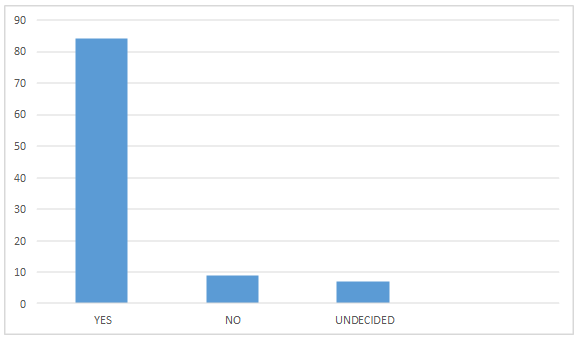
2. Do you support Kosovo's accession to NATO?
- YES 88.2%
- NO 7.1%
- UNDECIDED 4.7%
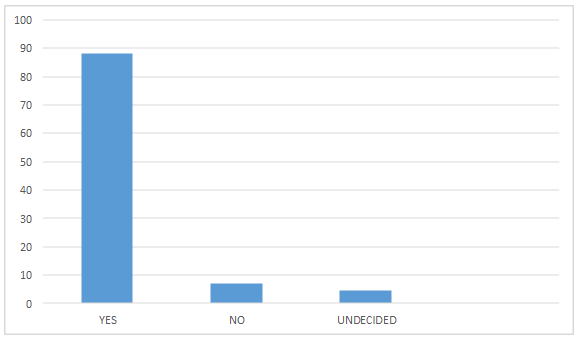
3. How would you assess the current political situation in Kosovo?
- GOOD 27.8%
- BAD 66.1%
- UNDECIDED 6,1%
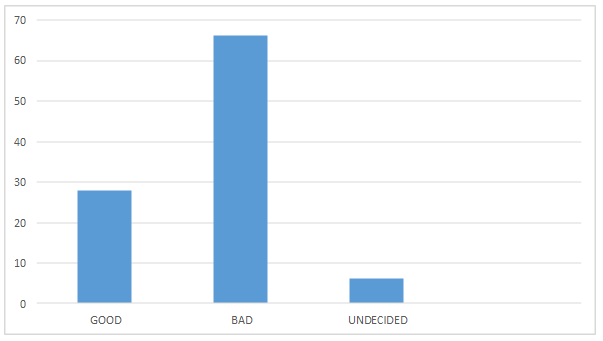
4. Do you think early election should be called in Kosovo?
- YES 63.5%
- NO 27.3%
- UNDECIDED 9.2%

5. How would you assess the work shown so far by Kosovo President Hashim Thaçi?
- POSITIVELY 16.1%
- NEGATIVELY 72.3%
- UNDECIDED 11.6%
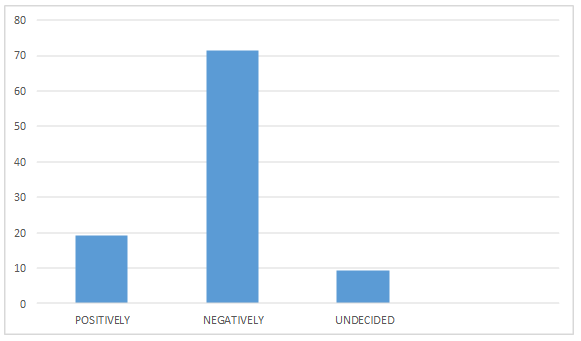
6. How would you assess the work shown so far by Kosovo government?
- POSITIVELY 19.1%
- NEGATIVELY 71.5%
- UNDECIDED 9.4%
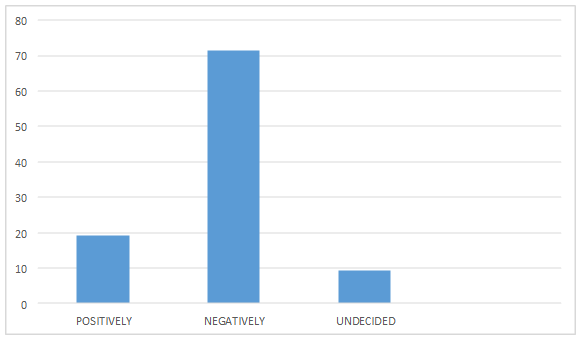
7. How would you assess the work shown so far by Kosovo judiciary?
- POSITIVELY 22.1%
- NEGATIVELY 74.6%
- UNDECIDED 3.3%
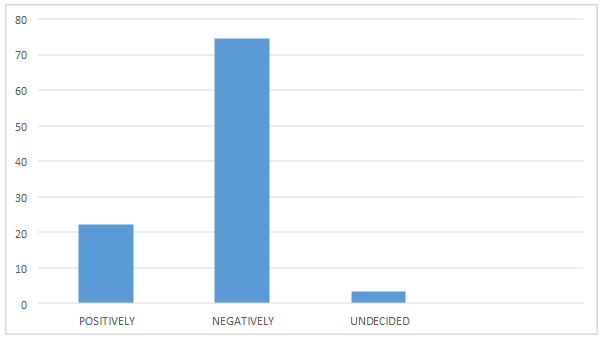
8. Do you support the formation of the Community of Serb Municipalities (ZSO) in Kosovo?
- YES 9.1%
- NO 82.5%
- UNDECIDED 8.4%
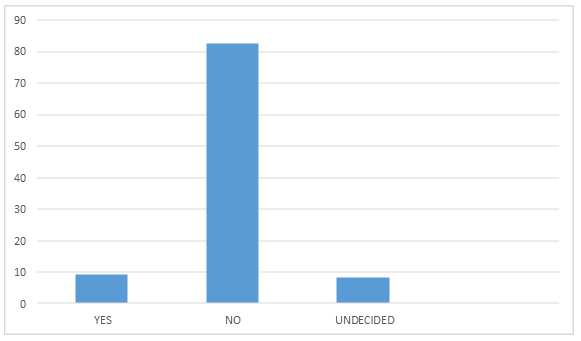
9. Do you support mass protests organised by the Self-Determination movement(LVV) ?
- YES 66.2%
- NO 28,2%
- UNDECIDED 5.6%
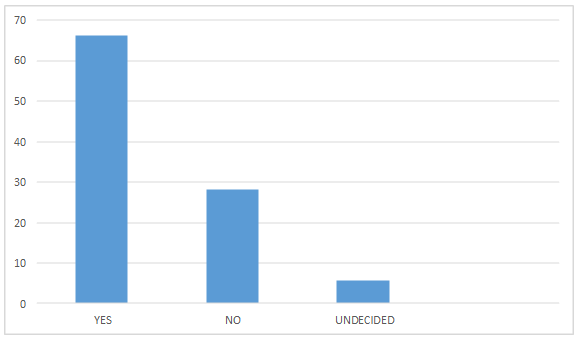
10. Who would you vote for if the election was held today?
- LDK 28.3%
- LV 23.1%
- PDK 22.9%
- AAK 10.1%
- Nisma 5.2 %
- AKR 1.6%
- PSD 2.2%
- Alternative 0.6%
- Other 6.0%
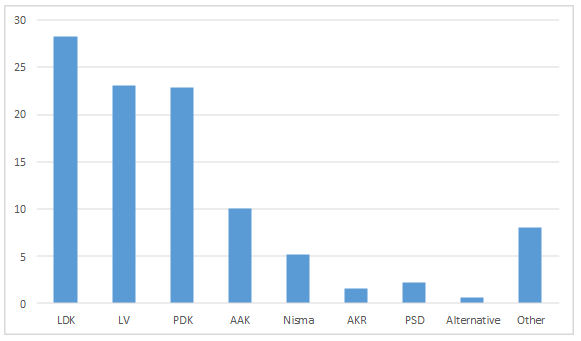
Note:
- LDK - Democratic League of Kosovo
- LV - Self-Determination movement
- PDK - Democratic Party of Kosovo
- AAK - Alliance for the Future of Kosovo
- Nisma - Social Democratic Initiative
- AKR - Alliance for the Future of Kosovo
- PSD - Social Democratic Party
- Alternative – Liberal Party
- Other - other political entities in Kosovo
Ljubljana, 4 October 2018